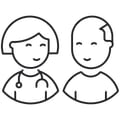Sepsis is a life-threatening reaction to an infection. Sepsis can develop very quickly. It can damage tissue and organs. Most of the time, sepsis is caused by a bacterial infection. An illness, an injury, or a reaction to surgery can also cause it.
Here are some things you can do to avoid sepsis while you're in the hospital.

Pay attention to how you feel. Sepsis can cause breathing problems, a fast heartbeat, chills, cool and clammy skin, skin rashes, and shaking. Other symptoms may include fever, low body temperature, confusion, and low blood pressure. Sepsis often causes a combination of these symptoms.

Tell someone on your care team if you are concerned about sepsis. If you have some of these symptoms and think something is wrong, tell a doctor or nurse. Tell them "I'm concerned about sepsis."

Help prevent infections. Wash your hands often while you are in the hospital. Keep any cuts, scrapes, and stitches clean. Your doctor or nurse will help with this.

Ask family or friends NOT to visit you if they're sick. It's best to avoid people who are sick while you're in the hospital.

Make sure you've gotten recommended vaccines. If you've had vaccines to prevent COVID-19, pneumonia, flu, and other infections in the past, ask your doctor if you need another dose.

Do not smoke or use other tobacco products. When you quit smoking, you are less likely to get a cold, flu, or infection. Now can be a good time to think about quitting for good. If you need help quitting, talk to your doctor about stop-smoking programs and medicines.







